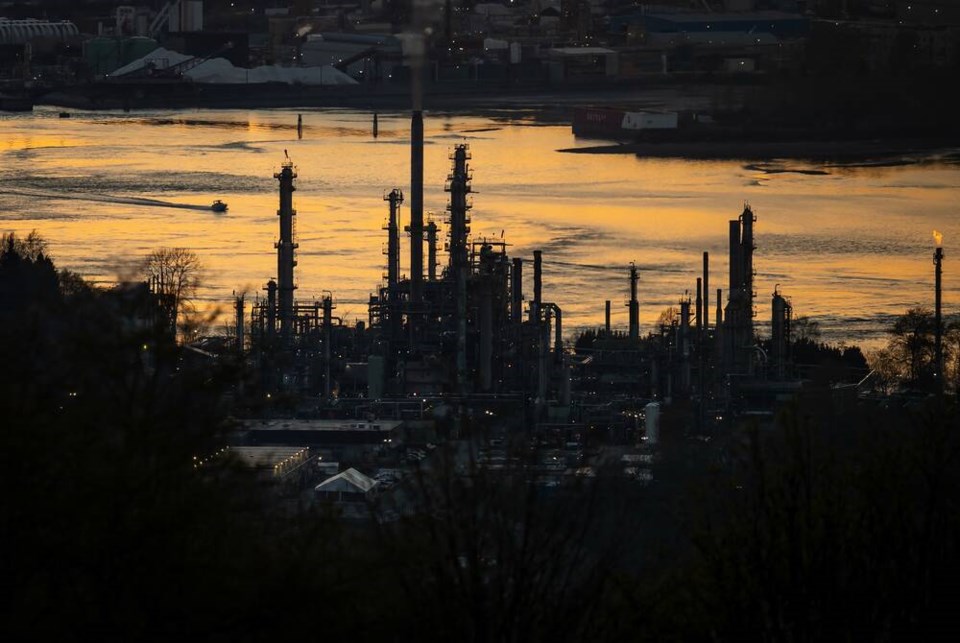CALGARY — Fuel retailer Parkland Corp. has lowered its full-year earnings forecast as sluggish market conditions continue to take a bite out of margins at the company's Burnaby, B.C. refinery.
The Calgary-headquartered company is experiencing similar challenges to refiners worldwide, as the industry deals with a glut of fuel supply and weak global economic conditions that have reduced demand.
On a conference call to discuss the company's third-quarter financial results Thursday, CEO Bob Espey said adjusted earnings from the company's refining segment fell 73 per cent year-over-year, to $49 million compared to $188 million in the same three-month period last year.
He said this was in spite of Parkland's Burnaby refinery operating smoothly, with a strong utilization rate.
Globally, refiners are dealing with weak "crack spreads," an industry term that measures the difference between wholesale petroleum product prices and crude oil prices.
When crack spreads are strong, refineries make more money, and when they are weak, refineries make less money.
Crack spreads globally are currently low due to a variety of factors, including weak economic conditions that have reduced fuel demand in China as well as the U.S. government's sale of 1 million barrels of gasoline last quarter from its Northeast supply reserve, which pushed more fuel onto the market.
"In terms of the dynamics that are causing the crack spreads to come down, there is a period here where we're seeing lots of supply, so the market is sloppy," said Espey.
"Generally what we see in times like that, which we've seen in the past, is the market does work to clean itself up ... We do see global demand continuing to grow next year, which will start to improve some of the oversupply globally."
The current market conditions are so difficult that some U.S. refiners have announced plans to temporarily curb their output as a result of the weak market conditions.
Many global oil majors are also reporting decreased third-quarter earnings due to weakness from their refining segments. Reuters reported Thursday that French giant TotalEnergies saw its third-quarter earnings hit a three-year low this year, in large part due to the collapse of refining margins.
For its own third quarter, Parkland reported its earnings declined by 60 per cent year-over-year, from $230 million in 2023 to $91 million in the third quarter of 2024.
Espey said while he does believe the market will ultimately correct itself, he expects the challenging refinery market conditions to persist through the remainder of the year.
Parkland said Wednesday after the close of markets that it is lowering its full-year 2024 adjusted earnings guidance to between $1.7 and $1.75 billion, down from a previous forecast of between $1.9 and $2.0 billion.
This is the second consecutive quarter the company has lowered its forecast, from $1.95 billion to $2.05 billion originally.
It attributed the lower forecast largely to due to the lower refining margins in the third quarter, as well as the unplanned outage that occurred at the Burnaby refinery in the first quarter of this year.
“I believe our business is resilient and these headwinds are temporary," Espey said.
Parkland's Burnaby refinery, which the company acquired in 2017, is one of Canada's only remaining West Coast refineries. It provides a quarter of the gasoline and diesel consumed in the province of B.C.
The company also operates approximately 4,000 fuel and convenience retail stores and commercial locations across Canada, the U.S. and the Caribbean.
This year, Parkland has continued to face calls to take drastic action to improve its share price performance, which is down 23 per cent from the start of the year.
Both U.S.-based activist investor Engine Capital LP, as well as Parkland's largest shareholder Simpson Oil Ltd., have called on Parkland to conduct a review of strategic alternatives — including a possible sale of the company.
Parkland has said such a review is unnecessary and does not consider the best interests of the majority of its shareholders.
In August, Simpson Oil — which is based in the Cayman Islands and owns about 20 per cent of Parkland's shares — launched a lawsuit against the fuel retailer. The lawsuit seeks to overturn a set of voting restrictions that are part of a 2019 board governance agreement between Simpson and Parkland.
This report by The Canadian Press was first published Oct. 31, 2024.
Companies in this story: (TSX:PKI)
Amanda Stephenson, The Canadian Press




